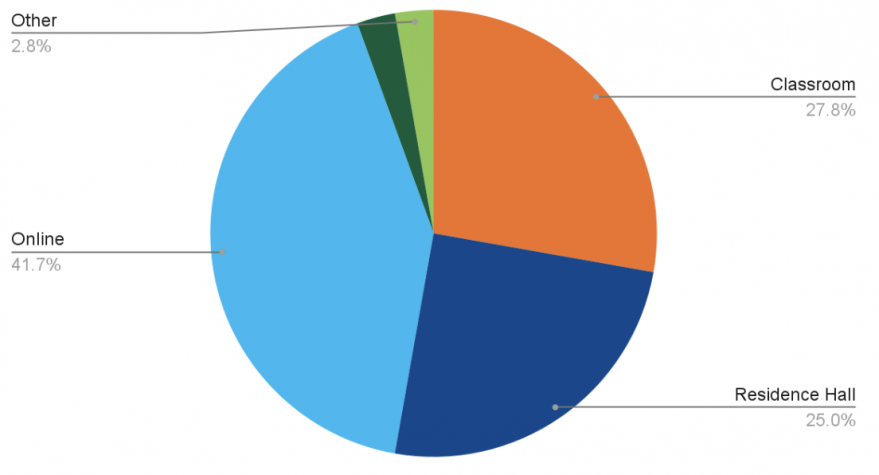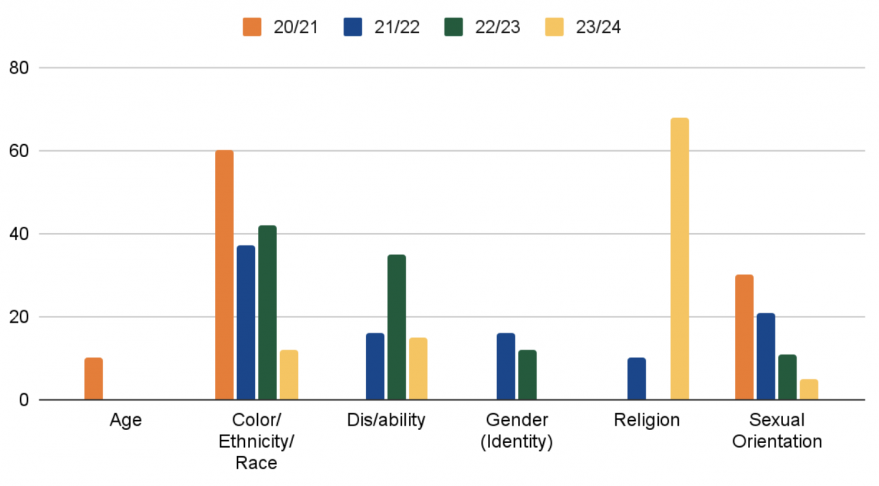main contentAnnual Bias Incident Reports
Summary of Bias Incident Reports, June 1, 2023 - May 31, 2024
Purpose
The Bias Assessment and Reporting Team (BART) is a reporting process that provides a system to assist individuals and groups affected by bias incidents, track and document these occurrences, and propose responses and interventions aimed at reducing bias on campus.
Our aim is to cultivate a campus culture where everyone feels valued and respected while honoring individual rights. The safety and well-being of community members are our top priorities.
Do you have a report you need to submit? Submit a report here.
BART Team
The Bias Assessment and Reporting Team (BART) is a collaborative system involving several offices, including the Office of Equity and Inclusion, the Office of Student Rights and Responsibilities, the Division of Student Life, Deans Offices, and the Office of Human Resources, among others. The team assembled for any given case depends on the nature of the case and the community members involved. All team members are experienced, knowledgeable, and committed to upholding a fair, neutral, constructive, community-centered, and efficient process.
The team is led by the Office of Equity and Inclusion:
- Jaime Cale, OEI Program Manager
45 total reports, 36 original
-
The Bias Assessment and Reporting Team received 45 reports from June 1, 2023 - May 31, 2024, with 36 being original.
Submitted By |
# of Reports |
Percentage |
| Students | 26 | 72% |
| Staff | 4 | 11% |
| Faculty | 2 | 6% |
| Other | 4 | 11% |
Submissions of Reports
- The majority of reports were submitted by students about students. There were multiple reports about the same incident, occurring 9 times for one incident.
| Submitted By | # of Reports | Percentage |
| Students | 21* | 58% |
| Staff | 2 | 6% |
| Faculty | 4 | 11% |
| Other | 9 | 25% |
*This includes 10 reports submitted about student groups/ clubs
| Basis of Bias Report | # of Reports |
Color/ Ethnicity/ Race |
3 |
Dis/ability |
3 |
Gender (Identity) |
2 |
National Origin |
2 |
| Religion | 23 |
Sexual Orientation |
3 |
| Other | 1 |
This data is from the 36 original reports in 2023-24.
Basis of Bias Report

| Location | # of Reports |
| Classroom | 10 |
| Off Campus | 1 |
| Online | 15 |
| Residence Hall | 9 |
| Other | 1 |
This data is from the 36 original reports in 2023-24.
Locations Reported

Total Original* Bias Reports by Academic Year

* “Original” is defined as unduplicated incident reports.
Basis of Bias Report

Most Frequent Incident Location by Academic Year
| Year | First Location | % of First Location | Second Location | % of Second Location |
| 2023-2024 | Online | 38% | Classroom & Residence Hall (tied) | 25% each |
| 2022-2023 | Residence Hall | 32% | Classroom | 27% |
| 2021-2022 | Classroom | 43% | Online | 24% |
| 2020-2021 | Online | 40% | Classroom | 30% |
Who is Reporting?
- Students are the primary reporters, which has been consistent over the past four years.
- Staff and faculty make up the second largest group of reporters on campus.
- Increased reporting over time may indicate overall increased awareness and effective outreach efforts to alert L&C community members of the BART system.
What is Reported?
- In 2020/21 race was identified as the most frequent basis of reports, whereas in 2023/24, religion was the frequent basis.
- Religion related reports rose sharply in the 2023/24 year, which also corresponded with a rise in online and anonymous reports.
- Sexuality and dis/ability reports have been consistent over the years.
- Gender related reports have decreased over the years.
Where are Incidents Taking Place?
- Most reported incidents are taking place on campus in classrooms or residence halls–the locations that students frequent most often.
- There has been a significant increase in number of reports of online bias and harassment issues.
- Online incidents often present unique challenges related to anonymous identities and postings.
In a situation in which there is a Known Reporter and Known Person(s) of Concern, there are several options:
- Informal conversation: BART team staff member meets with one or both parties to discuss the incident and offer supports. Both parties agree to informal outcome (education, learning opportunity, accord, etc.)
- Formal conversation: The parties agree to talk to one another in a guided conversation about the incident in attempts to repair and/or restore the relationship, results, or harm. Ongoing individual supports are also offered.
-
Referral to Conduct: If a case warrants the review of conduct policies and potential violations, an investigation may occur involving the appropriate lead offices, at times including a formal hearing and potentially resulting in sanctions.
In some circumstances, email correspondence with the reporter and/or involved party will suffice, and the case will be closed.
In a situation in which there is an Anonymous Party, there are options:
- BART team staff member communicates with reporter (email, phone or in-person) to discuss event and impacts.
- There are some limitations to the tracking and resolution of reports involving an anonymous reporter and/or an anonymous person(s) of concern.
- If the report concerns media, postings, or online behavior, the BART team can discuss options, supports, and decisions related to personal agency, safety, current policy, and potential future incidents.
- All reports, even anonymous reports, are logged and maintained.
As a result of the past year’s data, we have identified the following future directions:
- Continue promoting the BART system during New Student Orientation and via social media outlets campus-wide to build awareness and increase use of the reporting system.
- Address online digital citizenry responsibilities with students, clubs, and extracurricular organizations, using multiple strategies to communicate community expectations, provide training, and enlist peers to advance an inclusive and respectful climate.
- Work directly with impacted campus religious and affinity groups, leaders, and support services to implement preventive and responsive programming to address rising religious incidents.
- Increase training and build increased offerings in conflict mediation and informal resolution, such as restorative circles and facilitated conversations, to resolve conflict.
The BART team does not share specific outcomes of reports, in an effort to maintain confidentiality in a small campus community.
-
As part of our usual processes, cases in the 2023-2024 academic year concluded in a variety of outcomes:
- Conversations with BART team
- Facilitated conversations between parties
- Education and learning opportunities
- Policy review, discussion, and revision
- Disciplinary and conduct processes/hearings
- In the last 3 years (2021-2024), there have been 3 or fewer reports referred to the conduct office each year.
Equity and Inclusion is located in room 116-117 of McAfee on the undergraduate Campus.
MSC: 145
voice 503-768-7186
email: diversityinclusion@lclark.edu
Equity and Inclusion
Lewis & Clark
615 S. Palatine Hill Road
Portland OR 97219